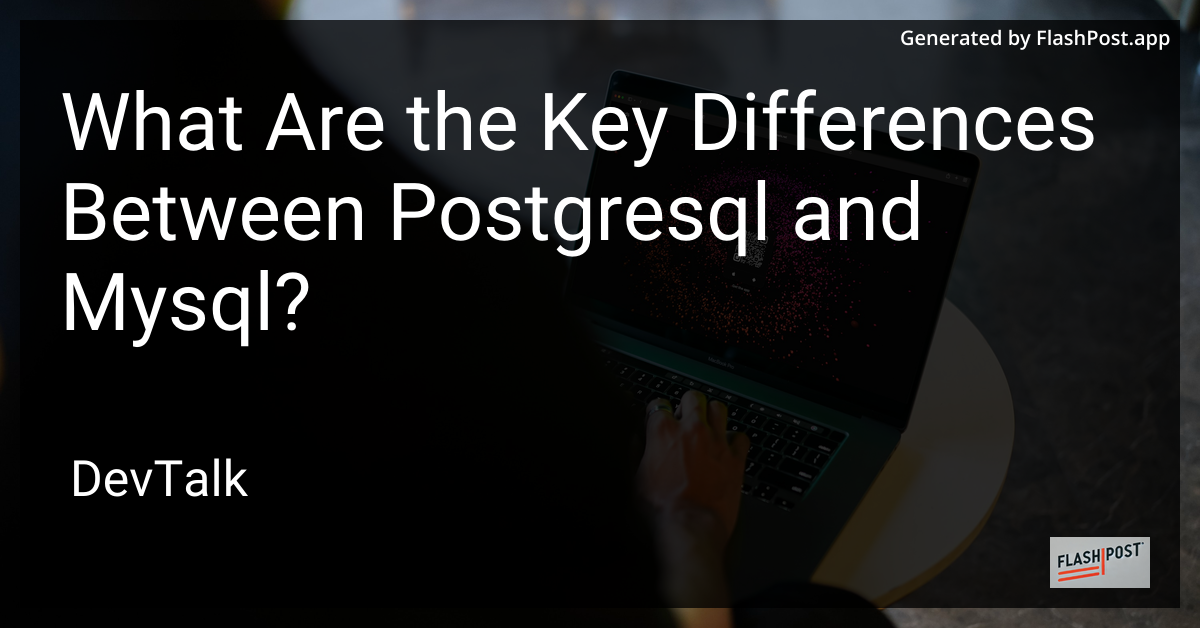What Are the Key Differences Between Postgresql and Mysql?
 # Key Differences Between PostgreSQL and MySQL
# Key Differences Between PostgreSQL and MySQL
When it comes to choosing the right database management system (DBMS) for your project, two of the most popular options are PostgreSQL and MySQL.
Both are powerful, open-source databases that have their own sets of features, advantages, and applications. But how do you decide which one best suits your needs? This article delves into the key differences between PostgreSQL and MySQL to help you make an informed decision.
1. Data Types and Flexibility
PostgreSQL
PostgreSQL is known for its advanced data type support. It offers a wide variety of data types, including native support for JSON, arrays, and user-defined types, which makes it incredibly flexible for developers. This flexibility allows for more complex data structures and can handle various use cases efficiently.
MySQL
MySQL, on the other hand, has a more limited set of data types compared to PostgreSQL. While it does support JSON, its native support isn't as feature-rich. However, MySQL is simpler and can be easier to work with for straightforward applications with traditional data needs.
2. ACID Compliance and Transaction Support
PostgreSQL
PostgreSQL is famed for its strict compliance with ACID (Atomicity, Consistency, Isolation, Durability) principles. It fully supports complex transactions, providing a robust environment for applications that require reliability and data integrity.
MySQL
MySQL supports ACID principles when using the InnoDB storage engine. However, other engines like MyISAM do not provide full ACID compliance, which could be a limitation for certain applications requiring rigorous transactional support.
3. Performance and Scalability
PostgreSQL
While historically considered slower in certain scenarios, PostgreSQL has made significant strides in improving performance and scalability. Its powerful indexing, query optimization, and use of MVCC (Multi-Version Concurrency Control) make it suitable for high-read, complex query environments.
MySQL
MySQL is often preferred for applications requiring high-speed reads and writes, partly due to its lower overhead and simpler architecture. It is generally considered more performant in web-based applications where read-heavy operations are the norm.
4. Community and Support
PostgreSQL
PostgreSQL has a smaller, albeit highly dedicated community. It offers extensive documentation and actively encourages community participation in development. This strong community backing results in constant enhancements and a rich set of features.
MySQL
Managed by Oracle, MySQL has a vast, global community with extensive support from both open-source contributors and corporate investment. Its large user base ensures that there are numerous resources, forums, and tools available for users.
5. Use Cases and Applications
PostgreSQL
Best suited for complex analytical processes, data warehousing, and geographical information system (GIS) applications, PostgreSQL is ideal for scenarios demanding advanced data types and extensive transactional operations.
Explore more about PostgreSQL database management by visiting this guide and learn how to handle database access.
MySQL
Perfect for web applications, MySQL is widely used in content management systems (CMS) like WordPress and e-commerce platforms. Its simplicity and speed make it a go-to choice for straightforward web applications.
6. Backup and Recovery
PostgreSQL
PostgreSQL provides robust backup and recovery options, including point-in-time recovery and streaming replication. To deepen your understanding, check out this article on database backup.
MySQL
MySQL also offers diverse backup methods but usually requires third-party tools for advanced backup solutions. Understanding its default tools and practices is crucial for effective data management.
Conclusion
Choosing between PostgreSQL and MySQL largely depends on your project needs. If you require advanced data types, complex queries, and strong ACID compliance, PostgreSQL might be the way to go. In contrast, if you're looking for speed, ease of use, and a robust web application database, MySQL could be the better choice.
For a deeper dive into PostgreSQL, including topics like database organization and row-counting in Django, explore further insights and detailed guides.
Ultimately, both PostgreSQL and MySQL have their strengths and can be exceptional choices depending on your specific requirements and application environment.